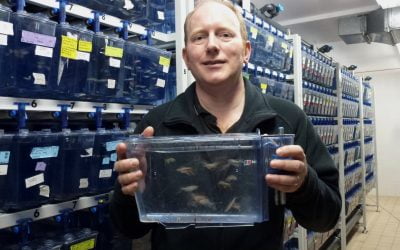Q & A with CEO Kyle Brown, Crossroads
New Registry Helps Researchers Find A Cure
The Hereditary Neuropathy Foundation (HNF) and Hannah’s Hope Fund (HHF) are excited about their partnership to co-fund the Global Registry for Inherited Neuropathies. According to the Global Rare Diseases Patient Registry and Data Repository (GRDR), rare diseases (6,500 disorders each occurring in fewer than 200,000 persons in the USA) are so uncommon that no single institution has sufficient numbers of patients to conduct clinical and translational research. Identifying patients and gathering information for many rare diseases is labor intensive and expensive. The GRDR allows any rare disease population, regardless of size, to collect patient data that can identify clinical trial candidates for research. By assembling many small patient registries into a common data repository, researchers will have the ability to look beyond a single gene/indication which may reveal associations between genes and diseases.
We asked Kyle Brown, CEO of Patient Crossroads Registry Network of California, to answer some questions about the benefit of a registry to CMT patients. Patient Crossroads is working to collect de-identified patient information for clinical research for the GRDR.
Why do we need a registry?
There is a huge reason to have a registry. How can you expect investments of millions of dollars without information? Raising visibility of any disorder to doctors and scientists is essential. For one thing, it encourages areas of research for scientists to go into. Raising awareness and presenting a cohesive front creates a community. It says “we are all willing to do whatever you need to help. We are willing to participate.”
Is there a downside to having a registry?
Only that when there are multiple foundations and organizations for a particular disease, they compete for patient data for selfish gains , to show themselves as having their hearts in the right place, but in order to get results the information should be shared. Unfortunately they see the information they have as a proprietary resource, belonging only to them. Organizations need a wake-up call to share data. Sharing should be rewarded. The Global Registry for Inherited Neuropathies will be shared!
Other than that, there isn’t a downside to having a registry. All patient information is secure and kept private.
Why should groups invest their limited resources in creating a registry instead of funding research?
It takes about $ 800,000,000 and approximately 12-14 years to develop a drug. It is not a smooth process, and most research gets hung up at Stage Three, which is conducting clinical trials. In order to test a drug you need enough people with the disease willing to participate in the trials. When a disease is rare or unknown, such as CMT, it is that much more difficult to assemble enough people for a trial. The registry will give researchers access to a significantly larger population of potential participants and that would speed up the process.
What else should we do to move toward treatments and a cure?
Get involved! Organize the patient community. Make your information available to researchers. Be willing to participate in clinical studies. Register by taking a short ½ hour – 45 minute medical questionnaire for the registry. I realize some people have survey fatigue. They think, “How many times am I going to be asked the same questions?” But having that information will be a huge asset for research on a global level.
Can you give an example of how?
It’s about numbers. The more people in need of a treatment or cure the greater the chance of getting funding. Additionally, if you can tie a rare disease to a common disease, which shares a lot of similarities, you can often find substantial funding for research. If you are lucky there is some advantage to a person with the rare disease taking the same drug.
Right now, there are about 20-30 million people listed on the Global Rare Registry and Data Repository. Why hold that information? Give it to the researchers, while keeping it private, to develop drugs we need. There are ethical ways to do what is right for the community and this is one of them.


![555[1]](https://www.hnf-cure.org/wp-content/uploads/2013/06/5551.jpg)



0 Comments